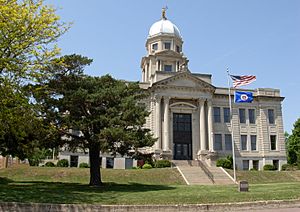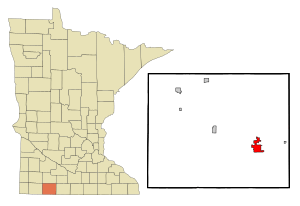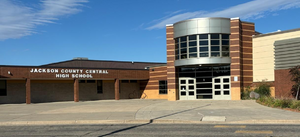Jackson, Minnesota facts for kids
Quick facts for kids
Jackson, Minnesota
|
|
|---|---|

Jackson County Courthouse in Jackson
|
|
| Motto(s):
"Come Grow With Us"
|
|

|
|
| Country | |
| State | |
| County | Jackson |
| Government | |
| • Type | Mayor – Council |
| Area | |
| • Total | 5.22 sq mi (13.53 km2) |
| • Land | 5.19 sq mi (13.45 km2) |
| • Water | 0.03 sq mi (0.08 km2) |
| Elevation | 1,312 ft (400 m) |
| Population
(2020)
|
|
| • Total | 3,323 |
| • Density | 640.15/sq mi (247.14/km2) |
| Time zone | UTC-6 (Central (CST)) |
| • Summer (DST) | UTC-5 (CDT) |
| ZIP code |
56143
|
| Area code(s) | 507 |
| FIPS code | 27-31562 |
| GNIS feature ID | 2395448 |
| Website | cityofjacksonmn.com |
Jackson is a city in Minnesota, United States. It is the main city and county seat of Jackson County. In 2020, about 3,323 people lived there.
Contents
A Look Back: Jackson's History
For many centuries, different Native American groups lived in this area. These included the Cheyenne, Ioway, and Dakota tribes. In 1851, a special agreement called the Treaty of Traverse des Sioux was made. This agreement allowed white settlers to move into the region.
Jackson was first called Springfield when it was founded in 1856. The very first settlers in what is now Jackson County were William, George, and Charles Wood. They set up a trading post near the Des Moines River around that time. A post office named Jackson started operating in 1858.
Early Challenges and Conflicts
Life for the early settlers was very tough. On March 26, 1857, a group led by Wahpekute Dakota Chief Inkpaduta attacked the settlement. This event is known as the Spirit Lake Massacre. Several people died, and the attackers took horses and supplies. A 14-year-old girl named Abbie Gardner was the only survivor. Because they were scared of another attack, the remaining settlers left the area.
A couple of months later, the Minnesota government officially created Jackson County. It was named after Henry Jackson, a merchant from Saint Paul. The main town was still called Springfield, but it was soon renamed Jackson. However, it took a long time for people to move back because of ongoing tensions.
In August 1862, the Dakota people became upset because the government was late with payments. This led to conflicts with settlers. These events started the U.S.-Dakota War. By August 24, the fighting reached Jackson County. Warriors attacked a community of Norwegian immigrants, killing several people. Just like in 1857, the remaining settlers fled, and Jackson County became empty again.
Rebuilding and Growth
After the American Civil War, people started to resettle in Jackson County. A strong fence, called a stockade, was built to protect new immigrants. Most of these new settlers came from northern and central Europe. They built their homes using wood from trees and sod from the prairie.
Life was still very hard. There were no proper roads or bridges, and only one school. The threat of attacks remained, and the area faced natural disasters like prairie fires, big snowstorms, and problems with crops. But these brave pioneers kept going. They helped build the strong farming and industrial community that Jackson is today.
Where is Jackson? (Geography)
Jackson is located in the middle of Jackson County. The city covers about 13.53 square kilometers (5.22 square miles). Most of this area is land, with a small amount of water.
Interstate 90 runs right through Jackson. This major highway goes all the way across Minnesota from east to west. U.S. Highway 71 is another important road in the city. South of Jackson, you'll find the Iowa Lakes region. This area has beautiful lakes like Spirit Lake and West Okoboji Lake.
Who Lives in Jackson? (Demographics)
| Historical population | |||
|---|---|---|---|
| Census | Pop. | %± | |
| 1880 | 501 | — | |
| 1890 | 720 | 43.7% | |
| 1900 | 1,756 | 143.9% | |
| 1910 | 1,907 | 8.6% | |
| 1920 | 2,144 | 12.4% | |
| 1930 | 2,206 | 2.9% | |
| 1940 | 2,840 | 28.7% | |
| 1950 | 3,313 | 16.7% | |
| 1960 | 3,370 | 1.7% | |
| 1970 | 3,550 | 5.3% | |
| 1980 | 3,797 | 7.0% | |
| 1990 | 3,559 | −6.3% | |
| 2000 | 3,501 | −1.6% | |
| 2010 | 3,299 | −5.8% | |
| 2020 | 3,323 | 0.7% | |
| U.S. Decennial Census | |||
In 2010, there were 3,299 people living in Jackson. About 93% of the people were White. There were also smaller groups of African American, Native American, and Asian residents. About 1.8% of the population was Hispanic or Latino.
The average age in Jackson was about 40.8 years old. About 22.7% of the people were under 18. Around 19.3% were 65 years old or older. The city had slightly more females (51.6%) than males (48.4%).
Places to Visit: Historic Sites
Jackson has several interesting historic sites:
- Ashley Park – Here you can find the Olson-Slaabakken cabin, which is the oldest building in Jackson County.
- Fort Belmont – This site includes an 1873 farmhouse, a blacksmith shop, a log cabin, and a stockade. It also has the 1902 Delafield Lutheran Church.
- Jackson County Fair Village – Located at the Jackson County Fairgrounds, this village has 20 historical buildings.
- Jackson County Historical Society and Museum – Found west of Jackson near Lakefield, Minnesota, this museum offers a look into the county's past.
- Jackson County Courthouse – Built in 1908, this beautiful building has murals in its courtroom and rotunda. It is listed on the National Register of Historic Places.
What Jackson Makes: Economy
Jackson is mostly a farming community. However, it also has a large industrial park. Many businesses operate here, including AGCO, Last-Deck, USF Holland, New Fashion Pork, HitchDoc, and Pioneer. AGCO and Challenger tractors are even made right here in Jackson!
Learning in Jackson: Education
The Jackson County School Board manages the public schools in the county.
Jackson is also home to Minnesota West Community and Technical Community College. This college is part of the Minnesota State system.
Getting Around: Transportation
The city has its own airport, called Jackson Municipal Airport. It is located about 3.7 kilometers (2.3 miles) north of the city's main business area.
News and Entertainment: Media
Jackson has access to several television channels. These channels offer different types of programs, including news, educational shows, and entertainment.
Famous People from Jackson
Many notable people have connections to Jackson:
- Gary Amdahl, an author.
- Jeffrey Bullock, who is the president of the University of Dubuque.
- Stephen Censky, who served as the U.S. Deputy Secretary of Agriculture.
- David Ellefson, a former bassist for the band Megadeth.
- Willis H. Flygare, a chemistry professor at the University of Illinois.
- Bjarne Elgar Grottun, a Minnesota state senator who grew up in Jackson.
- Walter Halloran, known for his work related to a famous story that inspired the novel The Exorcist.
- Milton C. Portmann, a professional football player and a decorated U.S. Army officer.
See also
 In Spanish: Jackson (Minnesota) para niños
In Spanish: Jackson (Minnesota) para niños
 | William Lucy |
 | Charles Hayes |
 | Cleveland Robinson |


